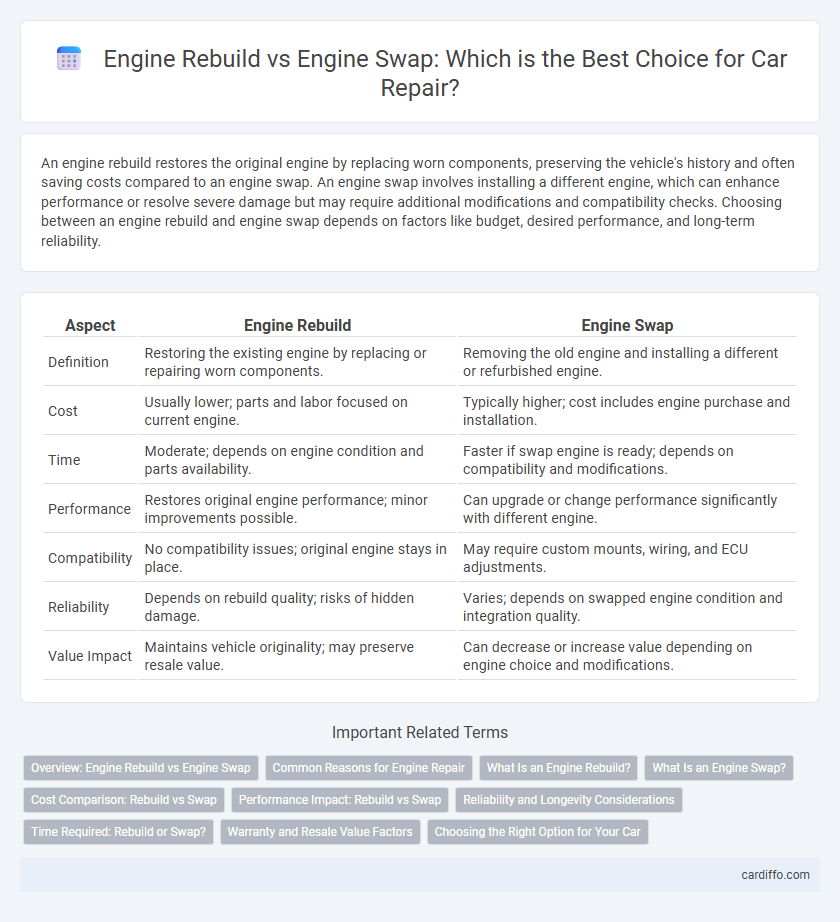An engine rebuild restores the original engine by replacing worn components, preserving the vehicle's history and often saving costs compared to an engine swap. An engine swap involves installing a different engine, which can enhance performance or resolve severe damage but may require additional modifications and compatibility checks. Choosing between an engine rebuild and engine swap depends on factors like budget, desired performance, and long-term reliability.
Table of Comparison
| Aspect | Engine Rebuild | Engine Swap |
|---|---|---|
| Definition | Restoring the existing engine by replacing or repairing worn components. | Removing the old engine and installing a different or refurbished engine. |
| Cost | Usually lower; parts and labor focused on current engine. | Typically higher; cost includes engine purchase and installation. |
| Time | Moderate; depends on engine condition and parts availability. | Faster if swap engine is ready; depends on compatibility and modifications. |
| Performance | Restores original engine performance; minor improvements possible. | Can upgrade or change performance significantly with different engine. |
| Compatibility | No compatibility issues; original engine stays in place. | May require custom mounts, wiring, and ECU adjustments. |
| Reliability | Depends on rebuild quality; risks of hidden damage. | Varies; depends on swapped engine condition and integration quality. |
| Value Impact | Maintains vehicle originality; may preserve resale value. | Can decrease or increase value depending on engine choice and modifications. |
Overview: Engine Rebuild vs Engine Swap
Engine rebuild involves disassembling, cleaning, and replacing worn components within the existing engine to restore its original performance and extend its lifespan. Engine swap replaces the entire engine with a new or used engine, often offering enhanced power, reliability, or compatibility improvements. Choosing between engine rebuild and engine swap depends on factors like cost, vehicle age, engine condition, and desired performance outcomes.
Common Reasons for Engine Repair
Common reasons for engine repair include excessive wear due to high mileage, overheating that causes head gasket failure, and oil contamination resulting in internal damage. Rebuilding an engine addresses issues like piston ring wear, valve deterioration, and bearing damage by restoring original components or replacing them with new parts. Engine swaps become necessary when repair costs exceed value or when catastrophic failures such as cracked blocks or seized engines occur.
What Is an Engine Rebuild?
An engine rebuild involves disassembling the existing engine, inspecting each component for wear or damage, and replacing or refurbishing critical parts such as pistons, valves, and bearings to restore the engine to like-new condition. This process retains the original engine block and maintains the vehicle's factory specifications while improving performance and extending engine life. Engine rebuilding is often chosen for preserving vehicle originality and being more cost-effective compared to full engine replacement.
What Is an Engine Swap?
An engine swap involves replacing the existing engine with a different one, often to improve performance, reliability, or compatibility. This process requires modifications to the vehicle's mounts, wiring, and sometimes transmission to accommodate the new engine. Engine swaps allow customization beyond factory specifications, offering options for upgraded powertrains or newer engines in older vehicles.
Cost Comparison: Rebuild vs Swap
Engine rebuilds typically cost between $2,500 and $4,000 depending on the extent of wear and required parts, while engine swaps can range from $3,000 to $7,000 due to the price of a used or new engine plus labor. Rebuilds often present a more cost-effective option when the existing engine block is intact, minimizing expenses on new components. Swaps may incur higher costs from additional modifications, such as mounting hardware and wiring compatibility, influencing overall repair budgets.
Performance Impact: Rebuild vs Swap
An engine rebuild restores the original engine components, enhancing performance by improving reliability and efficiency while maintaining factory specifications. An engine swap can significantly boost performance by replacing the stock engine with a more powerful or modern unit, offering higher horsepower and torque gains beyond rebuild capabilities. Rebuilds optimize existing engine potential, whereas swaps deliver transformative performance improvements tailored to specific power goals.
Reliability and Longevity Considerations
Engine rebuilds restore the original engine by replacing worn components, maintaining the vehicle's factory specifications and often extending its lifespan with proper maintenance. An engine swap introduces a different or newer engine, which may vary in compatibility and require modifications, potentially impacting reliability if not expertly executed. Considering reliability and longevity, a rebuild tends to preserve original performance standards, while a swap can offer improved durability if matched correctly to the vehicle's design and usage needs.
Time Required: Rebuild or Swap?
Engine rebuilds typically require 20 to 40 hours depending on the engine's condition and complexity, involving disassembly, cleaning, machining, and reassembly of internal components. Engine swaps generally take 8 to 16 hours when using compatible replacement engines, with time focused on removal, installation, and recalibration. Time efficiency often favors engine swaps, especially when a reliable donor engine is readily available.
Warranty and Resale Value Factors
Engine rebuilds often retain the original vehicle identification number, preserving factory warranty coverage and enhancing resale value due to perceived originality. Engine swaps may void existing warranties and complicate title registrations, potentially reducing market appeal and buyer confidence. Selecting a rebuilt engine supports long-term investment by maintaining warranty protections and favorable resale conditions.
Choosing the Right Option for Your Car
Engine rebuilds restore the original components by replacing worn parts, maintaining your car's factory specifications and preserving its value. Engine swaps involve replacing the entire engine with a different or upgraded unit, often improving performance but potentially increasing costs and complexity. Evaluating vehicle age, budget, intended use, and desired performance ensures selecting the optimal solution for long-term reliability and cost-effectiveness.
Engine rebuild vs engine swap Infographic

 cardiffo.com
cardiffo.com